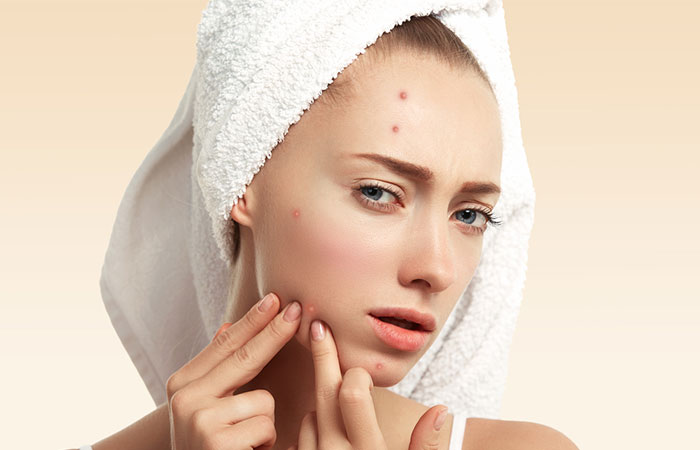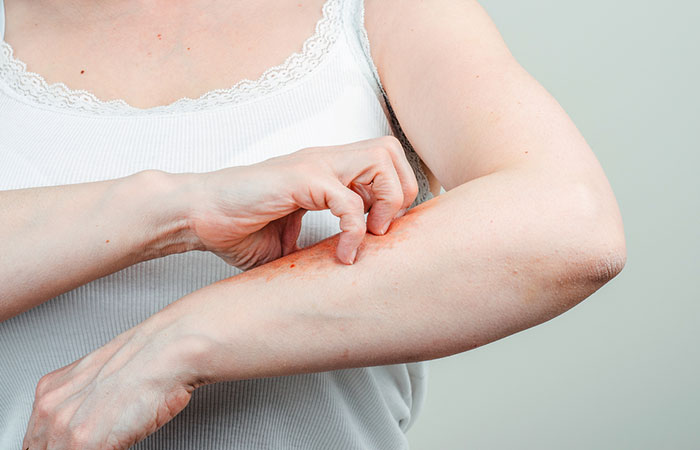You may not have heard of baobab oil. What’s interesting is that it is an ingredient in any of your skin care products. When it comes to natural skin care, baobab oil is being considered the next big deal. Well, what’s so good about it?
What Is Baobab Oil? How Does It Help?
Baobab oil is extracted from the seeds of the baobab fruit. The tree is native to the African continent, and its scientific name is Adansonia digitata.
The fruit seeds are air dried in the hot sun. These are then cold pressed to extract the oil. The newly pressed baobab oil is filtered immediately for clarification – and then bottled for use.
Baobab oil is composed of fatty acids. The most important of those are palmitic, oleic, and linoleic acids (1). The oil is also a good source of protein and fat. It also contains certain important amino acids (glutamic and aspartic acids) (2).
The fatty acid composition (especially oleic and linoleic acids) makes baobab oil the ideal remedy for certain skin issues.
How Does Baobab Oil Benefit Your Skin?
The benefits of baobab oil can be attributed to the fatty acids present in it – oleic and linoleic acids. This unique combination is known to treat acne and the associated inflammation. The oil can also help treat skin issues like eczema and psoriasis.
1. Treats Acne
The unique blend of oleic and linoleic acids in the oil decongests skin pores. The fatty acids also balance sebum production. Linoleic acid in baobab oil also inhibits the inflammation associated with acne (3).
Studies have found that acne patients tend to have lower levels of linoleic acid on their skin surface (4). The hypothesis is that lower concentrations of linoleic acid in sebum impose a state of essential fatty acid deficiency on the cells – potentially causing acne.
Depletion of linoleic acid may also lead to a condition called follicular hyperkeratosis (excessive keratin in hair follicles). Follicular hyperkeratosis greatly contributes to blackheads (5).
Topical linoleic acid also helps prevent blackheads and associated blemishes (6). As baobab oil is a rich source of linoleic acid, it may greatly help in treating acne.
2. Helps Fade Scars And Stretch Marks
A particular plant body oil rich in oleic and linoleic acids was found to improve the appearance of scars and striae (7).
Though there is no direct research, baobab oil, being rich in these two acids, might have similar effects on scars and stretch marks. We need more research in this regard, though.
3. Moisturizes Skin
Studies how that high linoleic acid concentrations can boost skin barrier repair and development. This improves skin hydration (8). Topical application of baobab oil might hence promote skin moisturization.
4. Might Aid Treatment Of Eczema And Psoriasis
Research states that linoleic acid shows promise in treating skin disorders like psoriasis and atopic dermatitis. It protects the barrier of the outer skin layer and also promotes wound healing (9).
Baobab oil also fights inflammation (10). This may further help in the treatment of eczema and psoriasis.
5. May Delay Signs Of Aging
Higher intake of linoleic acid is associated with a lower likelihood of skin atrophy. When this is complemented by reduced intake of fat and carbs, the result could be better skin aging. (11).
But talking about baobab oil, it is better you stick to topical application only. Whether this alone can offer anti-aging benefits is something that needs research – but you sure can try it topically.
Baobab oil has great potential as a skin-rejuvenating agent. Including it in your skin care regimen can offer wonderful benefits. While we need more research to substantiate some of the benefits we discussed, there’s no harm in trying it, right? A large body of research speaks of the pharmacological properties of baobab oil and the significance it can have in the cosmetic industry when topically applied (12).
On that note, where do you get baobab oil?
Where To Buy Baobab Oil
Remember to go for unrefined and 100% pure baobab oil. Check the labels. The oil extracted through cold pressing works best. You can get your bottle of baobab oil from your nearest health store or even online here.
But before you go ahead and make the purchase, you need to know if baobab oil would be suitable for you.
What Are The Side Effects Of Baobab Oil?
Research doesn’t state any side effects following the topical application of baobab oil. However, if you have sensitive skin, do a patch test.
Do not ingest baobab oil. The seeds from which the oil is extracted contain antinutrients, which may impair the absorption of certain nutrients in the body (13).
Conclusion
Now we know why baobab oil is considered the next big thing skin care. It has a unique composition of fatty acids – and that sets it apart. Make sure you include it in your skin care regimen today. Share your experience and feedback in the comments section below.
References
- “Fatty acid composition of baobab seed…” Wiley Online Library.
- “Chemical and nutrient analysis of…” Plant Foods for Human Nutrition, US National Library of Medicine.
- “Therapeutic agents and herbs in topical…” International Journal of Cosmetic Science, Wiley Online Library.
- “Essential fatty acids and acne” Journal of the American Academy of Dermatology, US National Library of Medicine.
- “Lipid mediators in acne” Mediators of Inflammation, US National Library of Medicine.
- “Digital image analysis of the effect of…” Clinical and Experimental Dermatology, US National Library of Medicine.
- “Observer-blind randomized controlled study…”. International Journal of Cosmetic Science, Wiley Online Library.
- “The role of moisturizers in addressing…”. Clinical Medicine & Research, US National Library of Medicine.
- “Healing fats of the skin…”. Clinics in Dermatology, US National Library of Medicine.
- “Intravesical natural baobab oil…”. ClinicalTrials, US National Library of Medicine.
- “Dietary nutrient intakes and skin-aging…”. The American Journal of Clinical Nutrition, US National Library of Medicine.
- “Beauty in baobab: a pilot study of the safety…”. ScienceDirect.
- “Effect of fermentation on the nutrient and antinutrient…”. Ecology of Food and Nutrition.
The post 5 Amazing Reasons For Using Baobab Oil On Your Skin appeared first on STYLECRAZE.


0 Comments